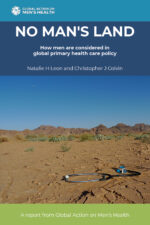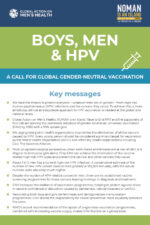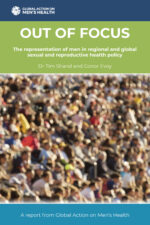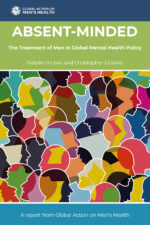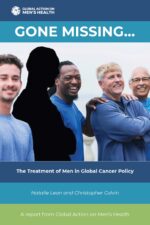Men's Health Week 2024
International Men’s Health Week 2024 was 10-16 June.
Men’s Health Week was 30 years old this year. It began in the U.S. in 1994 following a Senate Joint Resolution to establish the Week by Senator Bob Dole. The Week was linked to Father’s Day in the U.S. (the Week always ends on that Day, the third Sunday in June) and it became an international event in 2002 when it was first marked in the UK.
It has since been adopted in Australia, Canada, Denmark, Ireland, New Zealand and beyond. The Week provides an opportunity for a wide range of organizations and individuals to draw attention to the poor state of men’s health, organize activities that engage men, and advocate changes to health policy and practice. In short, it puts men’s health on the map both nationally and globally.
Canadian Men’s Health Foundation
2024 was the fourth annual Men’s Health Month for the Canadian Men’s Health Foundation (CMHF) and the 10th annual Men’s Health Week. The theme was: Move for Your Mental Health. It wrapped up over 14 million campaign views.
Two new research studies on men’s mental health and exercise fuelled national media conversations, including over 20 TV, radio and digital segments. (Here CBC Canada Tonight’s Travis Dhanraj speaks with Men’s health researcher and clinician Dr. David Kuhl.)
CMHF campaign partners Club16 Trevor Linden Fitness and ParticipACTION powered new science-backed workout videos and podcast episodes which were played over 560,000 times.
Fundraising events from coast to coast inspired communities while raising generous support including one father and son duo who drove 14,250km from Asia to Europe for men’s mental health.
CMHF would like to thank their generous partners, donors, CMHF National Champions, and all who help them reach and inspire more Canadian men and their families every year.
Men’s Health Network (USA)
The main aim of the MHN is to encourage and support activities by independent groups all around the USA to democratise and institutionalise Men’s Health Week/Month as part of the national culture.
Among the hundreds of events, the MHN plays a crucial role in promoting men’s health by hosting and attending Men’s Health Month and Men’s Health Week Health Fairs. These events are essential for raising awareness about various health issues that disproportionately affect men, such as cardiovascular disease, prostate cancer, and mental health disorders. By providing free health screenings, educational resources, and opportunities for men to engage with healthcare professionals, these health fairs identify potential health problems early, which is vital for effective treatment and prevention. Moreover, the fairs foster a community-focused approach, encouraging men to take proactive steps toward maintaining their health and well-being.
The MHN also supports ‘Wear Blue Day’ in which organisations use various platforms and activities to raise awareness about men’s health issues, encouraging men to wear blue and promote health screenings, physical fitness, and mental health awareness. The ‘Wear Blue’ campaign is part of a broader initiative to highlight the importance of preventive healthcare, and early detection of diseases that commonly affect men. Organisations that wore blue included: MHN, Office of Minority Health (OMH), Centers for Disease Control and Prevention (CDC), National Health Service Corps (NHSC), American Association of Nurse Practitioners (AANP), American Public Health Association (APHA), Blue Cross Blue Shield Association, American Heart Association (AHA), U.S. Department of Health and Human Services (HHS), National Institutes of Health (NIH), Veterans’ Health Administration (VHA), American Cancer Society (ACS), American Diabetes Association (ADA), Mayo Clinic, Cleveland Clinic, Johns Hopkins Medicine, Kaiser Permanente, UnitedHealth Group, Blue Shield of California and American Medical Association (AMA).
Men’s Health Forum (UK)
Men’s Health Weeks in the UK usually focus on general issues around men’s health rather than specific diseases. However, the announcement by King Charles III that he had a prostate problem changed all that.
The King’s announcement led to a national conversation (as well as a lot of internet searches) prompting the Forum to produce one of their award-winning man manuals to introduce men to this unfamiliar organ and answer all the questions they were asking. P For Prostate flew off the shelves during the Week.
The King speaking out also drew attention to the broader benefit of men sharing stories. The point of talking is one of the Forum’s key talking points and one it emphasised again during the Week. Most men will not have the same impact as the King but if sharing a health story benefits just one other man then it must have been worth it. The Forum’s Men’s Health Champions training programme remains a key part of its work to make it easier for men to talk about traditionally taboo topics.
Men’s Health Week 2023
Last year, these were some of the themes.
The Men’s Health Forum in Ireland‘s theme was ‘The Picture of Health’ and is asking men to think about ‘what does that look like to you?’ and to set a simple goal – and go for it!
The Men’s Health Forum (Great Britain) looked at the impact of the internet on men’s health. The iPhone was born in 2007. Those born in the same year will turn 16 this year. They’ve grown up with a high-performance computer in their pocket. What are the implications for men’s health? That’s the question the Forum was looking at with a focus on ‘internet-fuelled’ addictions including pornography and gambling.
In Australia, the Centre for Male Health focused on Healthy Habits, encouraging men and boys to build healthy habits by identifying small changes they can make that benefit their health and wellbeing. To celebrate this theme and to support organisations, groups and individuals during Men’s Health Week, the Australian Men’s Health Forum released a new Know Your Man Facts toolkit called ‘Exercise + Men’s Health.’ The toolkit included a tailor-made presentation, complete with speaker notes and social media graphics that can be shared across a variety of communication channels. There was also an infographic summarising key points and suggestions to make Men’s Health Week activities interactive.
The Canadian Men’s Health Foundation extended the Week into a Men’s Health Month emphasising the benefits of physical activity, ‘one step at a time’. One initiative was to encourage men to ‘park far away wherever you go’ and to share the distant parking place on social media.
In the USA, the Men’s Health Network also had a Men’s Health Month, part of which was ‘Wear Blue Day’ on 16 June.
And in Germany, the Men’s Health Foundation highlighted the important role of Men’s Sheds in tackling social isolation in older men.
GAMH launched its new report on men and global cancer policy, Gone Missing, to mark the start of an advocacy campaign to ensure that men’s needs are properly reflected in national and international cancer policies.
For more information about Men’s Health Week around the world, visit Men’s Health Network’s international web page.
#menshealthweek
